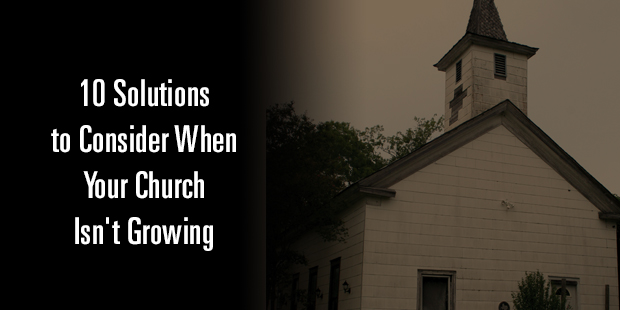
10 Solutions to Consider When Your Church Isn’t Growing
It’s one of the most pressing questions pastors and church leaders ask themselves:
“Why aren’t we growing?”
To be sure, not every mission’s soil will yield the same fruit. We’re not talking about overall size, but rather the idea that biblically, we can assume that God wants every church that honors His name and proclaims His message in Christ to grow and that He is willing to empower it to that end.
Churches are living things. Living things grow. If you’re not growing – even if just in compensation to what you’ve lost through transition – something is wrong.
Again, it doesn’t have to be by much. Those churches in smaller communities who are growing by five people a year may actually be growing at a higher percentage of the available population than the “mega” churches.
So take heart.
But if you are not growing at all, or declining…well, God isn’t the problem. We are.
Here are ten areas to consider as to “why”:
1. Leadership
It’s been said that everything rises and falls on leadership. Perhaps a more accurate way of putting it would be that no organization will rise above the level of its leadership.If, on a scale of 1-10, the current leadership is around a “4,” then it will be difficult for the church to grow beyond that level in terms of vision, effectiveness, strategy and impact.
Solution: Ensure that people with the spiritual gift of leadership are actually leading, and that they are committed to developing that gift by reading about leadership, getting around other leaders for insight, and exercising their leadership gift in challenging settings.
2. Communication
There are few things more critical to a church’s growth than an effective communicator for weekend teaching. The dilemma is that many who serve as the primary communicators in their church aren’t Spirit-gifted teachers. They like to speak, and the group that gathers around their teaching seems to benefit from it, but the majority of listeners tend to vote with their feet. At the very least, the teaching doesn’t seem to be catalyzing the congregation to invite their friends.
Solution: Make sure that the point communicator has the spiritual gift of teaching and is actively working at developing that gift by listening to other gifted communicators. Don’t be afraid of developing a team-teaching approach to shore up weakness, or to adjust responsibilities so that various roles more accurately reflect gifting. In other words, perhaps someone has been serving as lead communicator when their gifts are better used in another area. This is a difficult maneuver for, as stated above, people who are speaking tend to like to speak and have a (perhaps) distorted view of their effect.
3. Quality of Worship
The quality of the worship experience is more important even than its style. If the service itself seems slapped together, incoherent or unable to be embraced, then it will not provide the traction needed for ongoing growth. To be sure, worship is not about what we get out of it, but what God gets out of it. But the better that service is at helping people connect with God, the more people it will attract. And lest we forget, the weekend service is the “front door” of the church. So it’s where we “win” or “lose” people. Which means part of the “helping people connect” dynamic will include helping those far from God connect to God through what we offer.
Solution: Review the music, presentation, style and quality of the worship experience of your church in light of its ability to optimally serve and engage people. View the services of larger, faster-growing churches that you feel are biblically and theologically sound for benchmarks. If you are continually plagued by forgotten lyrics, missed notes and awkward transitions, consider planning meetings for your services and run-through rehearsals of critical parts. And by all means, look at your service through the eyes of someone far from God and deeply unchurched.
4. Atmosphere
Every church has an atmosphere, but not all have an atmosphere of friendliness and acceptance. Let’s put it bluntly: every church thinks it’s friendly. But what that often means is they are friendly to each other, friendly to people they know, friendly to people they like or friendly to people who are like them.
Solution: If you haven’t already, consider developing an entire ministry around first impressions and the creation of a friendly, welcoming atmosphere. At Meck, we call it “Guest Services,” and it oversees parking lot attendants, greeters, ushers, hospitality and so much more – all geared toward the experience of first impressions and friendliness. It’s one of our largest and most strategic efforts. In fact, one of the leading reasons people return to Meck is our friendliness.
5. Location
The physical location of a church, if you want to grow by inviting people to attend, is decisive. If it is hard to find, hard to get to, too small in size, has insufficient parking, is difficult to enter or exit due to road traffic,
…then you are artificially limiting the size of your church.
In essence, the shoe tells the foot how big it gets.
Solution: Much of solving location problems is logistical in nature. Hire off-duty police to help people enter and exit your services. Increase the number of your services. Develop a capital campaign to help pay for increasing the size of your auditorium or parking. If needed, simply move to a new location. That may seem dramatic, but it’s often critical. Going “multi-site” is also proving to be a helpful strategy for many churches facing location issues.
6. Structure
Most church structures are not “structured” for growth, much less unity. As an organization, you have to be able to seize opportunities, streamline decision-making and unleash the leadership gift. There is so much that could be said on this, so…
Solution: Read my chapter on “Rethinking Structure” in Rethinking the Church. Do away with committees, across-the-board majority rule and endless policies. Read the chapter and you’ll see why.
7. Methods
Values and doctrine are timeless; methods and strategies are not. Think of a method as a very time-bound approach to solving a problem or answering a challenge. A vast number of churches are employing methods that simply aren’t viable. They hold on to them out of an unfounded sense of loyalty, or even worse, a sense of orthodoxy. Methods don’t fall into that camp.
Solution: Go to school on other churches and their methods. Further, make a list of all of your methods that haven’t been evaluated in five years. That’s your “to do” list.
8. Blind Spots
Blind spots are interesting…they are what you do NOT see. Others can, but you can’t. It’s been said that we all have them – actually, many of them. Do you know yours? Do you know where you are weak, outdated, sloppy, understaffed, wrongly staffed, poorly funded…
Solution: Bring in “mystery” worshipers, or outside consultants, to observe you, talk to you, counsel you. Get 20/20 vision on as much as you possibly can.
9. Not Fueling Growth Engines
Every church has one or more “growth engines.” These are the ministries that fuel whatever growth you have. Most will think of their weekend services; and to be sure, that is a powerful growth engine. But many of your sub-ministries offer the same, if not more, of your overall growth power. For example, at Meck our weekend services may be a powerful engine, but we tend to think that MecKidz is even MORE powerful. So we give it what it needs to grow. Right now, it has the largest staff and the most square-footage of building space of any ministry.
Why?
It grows our church.
Solution: Fund your growth engines. Repeat: FUND YOUR GROWTH ENGINES. And look beyond the weekend. The biggest growth engine of all, in most churches, is the children’s ministry.
10. Unity
Jesus made it clear that unity would be THE verifying mark on His message. A unified church is a growing church. Period.
Solution: Do the hard leadership work of confronting division, dissension and disunity. See the chapter titled “No Tolerance” in What They Didn’t Teach You in Seminary (Baker).
One Last Thought
The most important principle I could pass on is this: think like a lost person.
Really.
Think like someone far from God, divorced from church, coming to your church, would think.
Then…
…change things.
Not the message. Heaven forbid. But do change anything and everything that would be a barrier to this person engaging Christ that does not involve altering the message of Christ.
If you’re not satisfied with your church’s growth, start a conversation with our team. We’re glad to offer our input. Your vision is at stake, so let’s talk.



























